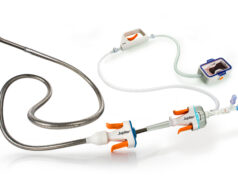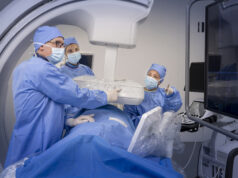
Toshiba announces the launch of the largest and most advanced commercially available mobile CT scanner in the UK. The new mobile imaging innovation already serves 12 CT imaging centres in the UK, travelling 3,500 miles per week from site-to-site.
Toshiba has unveiled an evolution of its mobile CT scanner fleet, using the company’s Aquilion Prime 160-slice scanner, which produces the best image quality in its class of any CT scanner on the market today, using what is believed to be the lowest radiation dose.
Designed to fit easily onto existing mobile imaging docking stations in hospitals, the new mobile imaging unit is 13.5m long and 2.5m wide when travelling, but extends to 5.25m in width when the three specially designed pods are deployed. The extension of the pods provides a large control room, a dedicated room for post processing and two changing rooms for a greater clinician and patient experience and comfort as well as faster, more efficient and effective patient throughput.
The new mobile CT forms a key part of Toshiba Medical’s unique commitment in the UK in providing 100% up-time for its customers. It can be used by hospitals to maintain clinical environments and zero downtime, whilst upgrading fixed systems, or to respond to patient flow increases as a flexible addition for busy scanning departments.
Ramsay Health Care, one of the largest providers of independent hospital services in England is the first UK healthcare provider to take advantage of the unique unit. The mobile scanner is being used on a daily basis across 12 of its hospitals taking mobile CT sites in England. From Renacres Hospital, and Oaklands Hospital in the North West, to Duchy Hospital in Truro in the South West, the mobile CT scanner currently travels an average of 3,500 miles per week as it serves Ramsay Health Care’s CT provision with great flexibility.
The new mobile CT unit comes complete with a set of post-processing options, from cardiovascular to dental and neuro applications, the scanner arrives at each hospital ‘ready-to-go’. Toshiba also provides free applications training as part of the service.
Amanda Blake, head of Diagnostic Services, Ramsay Healthcare said: “We have been using the new mobile CT unit across our hospitals for the past month. The unit is extremely accessible, especially to immobile patients. With no restrictions to the examinations we could carry out, the unit provided a spacious, efficient and relaxed environment for both our patients and clinicians.”
As with all models in Toshiba’s growing relocatable and mobile CT fleet, the latest mobile unit is designed in partnership with Bristol-based, WH Bence Ltd, one of Europe’s leading specialist vehicle manufacturers.
Designed for patient and clinician comfort, the unit incorporates state-of-the-art, iPad-controlled home automation technology including; ambient lighting, visual displays on walls and ceiling, Freeview TV and sound system, as well as hot and cold running water. The scanner control room is equipped with smart glass, which turns opaque when electricity is passed through it to ensure maximum patient privacy during examinations. Other features include CCTV monitoring and Radio Frequency Identification (RFID) access, which provides high levels of security for patients and clinicians.
Mark Hitchman, UK Managing Director for Toshiba Medical Systems is excited at the speed of evolution of the company’s mobile CT fleet: “We were proud to be the first medical equipment manufacturer to offer a mobile CT scanning service and we’re also proud to push the frontiers of inspiring design for imaging equipment in the UK. Our ethos of continual improvement regarding innovation and customer service has powered our efforts to design and put into production the UK’s most innovative design that houses the most advanced CT imaging equipment available today.
“We take great pride in investing in creative approaches to meet our customers‘ healthcare challenges of providing the highest quality patient care for continually increasing patient numbers“.










